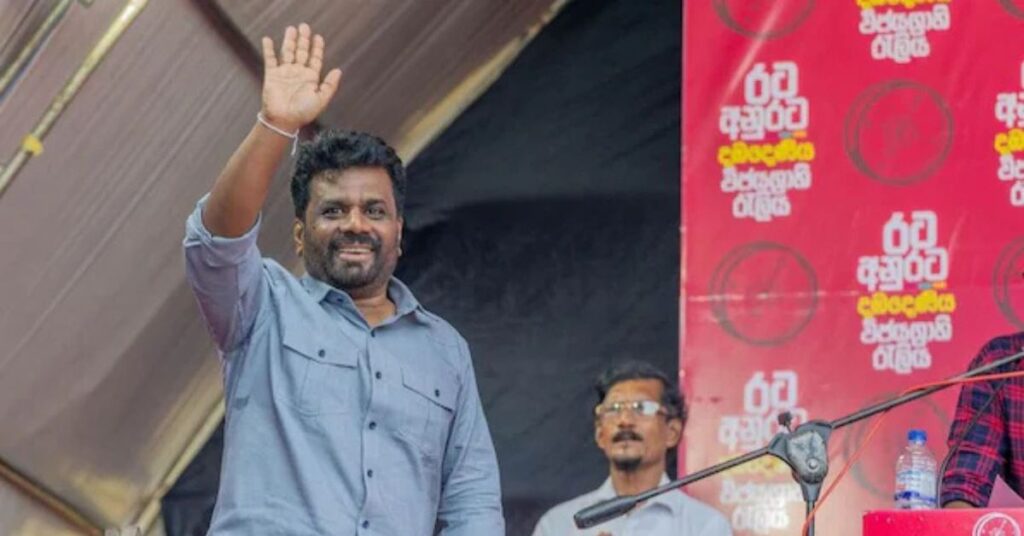The 2024 Sri Lankan parliamentary elections have concluded with a historic victory for President Anura Kumara Dissanayake and his National People’s Power (NPP) party. The NPP has successfully secured a majority in the 225-member parliament, solidifying its position as the dominant political force in Sri Lanka.
This victory is a significant milestone for the leftist coalition, which has gained widespread support following the country’s economic crisis and political upheavals over the past two years.
NPP’s Landslide Victory

The NPP, under Dissanayake’s leadership, garnered approximately 62% of the national vote, translating to over 4.4 million votes by early Friday morning.
This substantial lead has positioned the NPP to surpass the 150-seat threshold, ensuring an absolute majority in parliament.
The main opposition party, Samagi Jana Balawegaya (SJB), led by Sajith Premadasa, managed to secure only 18% of the vote, while former President Ranil Wickremesinghe’s National Democratic Front (NDF) trailed with less than 5%.
This election marks a pivotal moment for Sri Lanka as it is the first time a leftist coalition has controlled both the presidency and parliament.
The NPP’s victory will allow Dissanayake to push forward with his agenda of anti-poverty reforms and economic recovery measures aimed at alleviating the severe financial challenges that have plagued Sri Lanka since 2022.
A Shift in Political Power
The snap parliamentary elections were called by President Dissanayake shortly after his victory in the September 2024 presidential election. This was seen as a strategic move to consolidate power and secure a fresh mandate for his policies.
The NPP’s campaign focused heavily on addressing corruption, poverty alleviation, and economic reform—issues that resonated with voters still reeling from the aftermath of the country’s worst economic crisis in decades.
Dissanayake’s rise to power has been fueled by widespread disillusionment with traditional political elites, particularly following the ousting of former President Gotabaya Rajapaksa in 2022.
The NPP’s success in these elections reflects a broader desire for change among the electorate, with many voters seeking alternatives to the established political order.
Challenges Ahead for Dissanayake
While this victory gives President Dissanayake and his party a strong mandate, significant challenges lie ahead. Sri Lanka is still grappling with high inflation, unemployment, and a fragile economy that has yet to fully recover from the 2022 crisis.
The new government will need to navigate these issues carefully while implementing its ambitious reform agenda.
One of Dissanayake’s key promises during his campaign was to tackle corruption and introduce measures to support struggling families. However, balancing these domestic priorities with international obligations—such as those tied to Sri Lanka’s $2.9 billion IMF bailout—will be crucial in determining the success of his administration.
Implications for Sri Lanka’s Future
The NPP’s victory could signal a shift in Sri Lanka’s political and economic direction. As a leftist coalition with Marxist roots, the NPP is expected to pursue policies that focus on state intervention in the economy and social welfare programs aimed at reducing inequality.
This could lead to changes in Sri Lanka’s international relations as well, particularly with key partners like China and India.
Political analysts are closely watching how Dissanayake will handle these challenges and whether his government can deliver on its promises of reform without exacerbating existing economic problems.
With an absolute majority in parliament, he now has the political capital needed to push through significant changes—but whether these changes will bring about long-term stability remains to be seen.
FAQs
What percentage of votes did Anura Kumara Dissanayake’s NPP secure?
The NPP secured approximately 62% of the national vote.
How many seats did NPP win in the 2024 parliamentary elections?
The NPP is expected to surpass 150 seats in the 225-member parliament.
What does this election mean for Sri Lanka’s future?
This election could lead to significant policy shifts towards state intervention and social welfare programs under leftist governance.